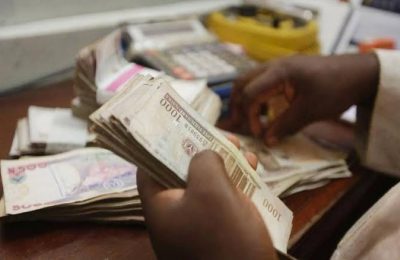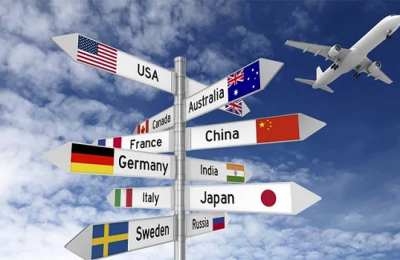
The Minister of Budget and Economic Planning, Atiku Bagudu, on Saturday, explained the true reason behind Nigeria signing the Samoa Agreement with the European Union (EU).
Controversy has been the order of the day following the signing which the Federal Government noted, will boost food security, and inclusive economic development, amongst other vital areas.

There’s been allegations that the agreement allows for the recognition of same-sex marriage rights by the Nigerian government.
Speaking at a press briefing on Saturday in Abuja, Bagudu clarified once again that none of the articles of the agreement between Nigeria and the EU showed that the former has recognised Lesbian, Gay, Bisexual, and Transgender (LGBT) rights.
Bagudu, alongside his counterpart in the Ministry of Information, Mohammed Idris, said Nigeria won’t enter into an agreement that was antithetical to the constitution as well as the religious and cultural sensibilities of the heterogeneous people of Nigeria.
The Economic Planning Minister explained that about 200 areas of cooperation were contained in the agreement signed by Nigeria and that aside from the agreement, an implementation agreement would be signed in each of the areas of cooperation.
He said the areas of cooperation would lead to “capital” and “technical support.”
On why the Federal Government signed the Samoa Agreement, Bagudu told newsmen that the agreement was for multi-sectorial development.
READ ALSO: Kaduna Police Nab Four Over Alleged Vandalisation Of TCN’s Infrastructure
His words: “When you get a copy of the agreement, you will see that this is a broad agreement. It is about education, it is about food security, it is about water and sanitation, it is about decent work, it is about demography, it is about youths, it is about culture and sustainable development, it is about inclusive economic development, it is about private sector development, it is about human rights, democracy and the rule of law, it is about good governance, public administration, personal data, peace and security.
“Each article is about an area of cooperation. We signed (an) agreement with the EU to say that we believe we can cooperate in these areas. In the several areas which are about almost 200 distinct areas.”
Bagudu said “about $600m worth of projects are coming under” the Investment in Digital and Creative Enterprises (iDICE) programme of the Federal Government.
“There was nowhere in the body of the document where you will see $150bn but these are agreements which I believe, like with other countries, define what we want to relate with those countries in, and how to about it.
“The agreement provides a proviso where each country, not just Nigeria, can issue a declaration clarifying some basis in which it is signed.
“We will make the declaration available, it’s a public document presented along with (the agreement), we didn’t offer it because of concerns about misrepresentation about LGBT for example.”
Last November, the European Union, its 27 member states and 79 member states of the Organisation of African, Caribbean and Pacific States (OACPS) signed an agreement in Apia, the capital of the Pacific island country of Samoa. Hence, it was referred to as the ‘Samoa Agreement’.
Nigeria signed the agreement on June 28, 2024, but it became public knowledge this week after a disclosure by Bagudu at a meeting with EU representatives.
Samoa deal sparked a barrage of reactions online with many opposing LGBT rights, which is contrary to the anti-same-sex marriages and gay relationships law enacted in 2014 by then President Goodluck Jonathan.
See Full Text Of Press Statement by Minister of Budget and National Planning, Bagudu
I. Background
The partnership between Nigeria and the Organisation of African, Caribbean and Pacific States (OACPS) dates back to the Georgetown Agreement of 1975, which brought together countries in Africa, Caribbean
and the Pacific for the establishment of a framework for trade and development cooperation with the European Union (EU) as one of its objectives.
2. The OACPS – EU Cotonou Agreement facilitated the commitment of about €1.7bn in grant aid alone to Nigeria through the 9th, 10th and 11th European Development Fund (EDF) during the period from 2000 – 2020. A recent survey shows that over 5000 water, sanitation, energy, education, health and other micro-project interventions were executed in about 4,800
communities in Nigeria over the course of the Agreement.
3. The OACPS in 2018 launched the processes for negotiation of a successor Partnership Agreement ahead of the expiration of the Cotonou Agreement in
2020. At its 107th Session in Lome, Togo, the OACPS Council of Ministers adopted a Negotiating Mandate and appointed the Minister of Foreign Affairs
of the Republic of Togo, Prof. Robert Dussey, as the Chair of the OACPS Central Negotiating Group (CNG).
Key Objectives and Priorities in the Negotiation
4. In launching the process for formal negotiations in the sidelines of the 73rd United Nations General Assembly (UNGA), the essence of the new partnership was to contribute to the attainment of sustainable development in all OACPS countries through strengthened and deepened political and
economic partnership, with the OACPS as a more effective global player.
The following thematic areas constituted the Pillars of the negotiation:
i. Human rights, democracy and governance in People-Centred and
Rights-Based Societies;
ii. Peace and security;
iii. Human and social development;
iv. Environmental sustainability and climate change;
v. Inclusive sustainable economic growth and development; and
vi. Migration and mobility.
II. Technical Negotiation of the New Partnership Agreement
5. The finalised texts for a new Partnership Agreement between the OACPS and the EU which was initialed on 15th April, 2021, comprises a common Foundational Compact and three Regional Protocols, namely: Africa –EU; Caribbean-EU and Pacific-EU Regional Protocols with each regional Protocol addressing the peculiar issues of the regions. The negotiations and outcomes
of the Agreement were largely based on universally accepted international laws, conventions and treaties applicable to the Parties.
III. Consultations and Nigeria’s Inputs to the Negotiation Process
6. The Federal Ministry of Budget and Economic Planning (FMBEP) in close collaboration with the Ministry of Foreign Affairs (MFA) and Federal Ministry
of Justice (FMOJ) duly followed-up on the negotiation of the Samoa Agreement since September 2018 and confirms that the outcome is in line with the:
➢ Global conventions, which Nigeria subscribes to and relevant for advancement of multilateralism; and
➢ Constitution of the Federal Republic of Nigeria and measures for deepening the development cooperation with the EU and OACPS.
7. In addition to the National Development Blueprints, the views of stakeholders for National positions on issues in the Negotiation process
through the following notable engagements:
i. Inter-Ministerial Meeting on the Nigeria – ACP/EU Partnership on Wednesday, 28th March, 2018;
ii. Sensitization Workshop on Negotiation of the OACPS – EU Post-Cotonou Agreement on 17th– 19th September, 2018;
iii. Inter-Ministerial Meeting on the Draft Evolving Text of the Post –
Cotonou Agreement on 30th November – 1st December, 2020; and
iv. Seminar on the New Framework and Instruments of the European Union Development Cooperation held at the Reiz Continental Hotel Abuja on Friday, 8th March, 2024 [Participants included, CSOs, NGOs, and religious bodies].
IV. Signing of the Post – Cotonou (Samoa) Partnership Agreement
8. At the event for signing of the new Partnership Agreement in Apia, Samoa on 15, November, 2023 by 47 out of 79 OACPS countries endorsed the Agreement. Ahead of the 30th June 2024 deadline for the Parties, Nigeria signed the Agreement on Friday, 28th June, 2024 at the OACPS Secretariat in Brussels, Belgium, after the last consultative meeting with Civil Society
Organisations (CSOs), religious bodies and other interest groups was convened. All the OACPS. Nigeria’s endorsement was accompanied with a Statement of Declaration, clarifying the understanding and context of the Agreement.
9. The Samoa Agreement is a vital legal framework for cooperation between the OACPS and the European Union, with the aim of promoting sustainable development, fighting climate change and its effects, generating investment opportunities and fostering collaboration among OACPS member States at the international stage. The EU and all its 27 Member states signed the Samoa Agreement on 15th November 2023. Out of the 79 members of the OACPS, 74 signed before the deadline of 30th June, 2024.
The OACPS members that are yet to sign are Equatorial Guinea (Africa) Cuba and Trinidad and Tobago (Caribbean) and Nauru and Tuvalu (Pacific).
Recommendations Next Steps
10. In preparation for the operationalization of the Samoa Agreement, the next steps of action include:
i. Ratification of the Agreement after due consideration/approval by the Federal Executive Council (FEC), National Executive Council (NEC), and
National Assembly;
ii. Launch of the Regional Compacts (Africa – EU; Caribbean – EU; and Pacific – EU);
iii. Effective participation at the forthcoming OACPS – EU Joint Council of Ministers meetings and other governance systems of Partnership; and
iv. Institution of structures for follow-up in the implementation of the Agreement in collaboration with Civil Society Organisations (CSOs) and
other interest groups.
Conclusion
11. The Samoa Agreement is a veritable instrument for Nigeria’s development cooperation with the EU beyond aid. The OACPS – EU Partnership is one of the most diverse and multifaceted development pact in
the international system. It is therefore pertinent for the Public to consult the relevant Ministries, Departments and Agencies (MDAs) for clarity on the far-reaching issues relating to multi-sectoral provisions of the Agreement







